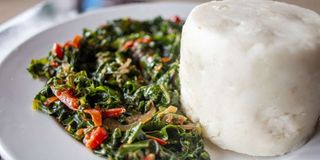Why it will cost ugali lovers more to put staple on table

Ugali.
What you need to know:
- This crop plays a major role in supplementing the produce from the main season by checking high cost of flour.
- Mr Kioko said they are sensitising farmers so that they can grow early maturing varieties to avoid losses.
- The short rain crop comes in handy at the time when stocks from the main harvest are being exhausted.
Kenya is staring at making more maize imports next year to cover an anticipated deficit due to depressed short rains, growers have warned, setting consumers up for higher food prices at a time when purchasing power has been eroded by job losses and pay cuts.
The weatherman has said the country should brace for depressed rainfall during this period, which coincides with the season when the short rain crop is planted.
This crop plays a major role in supplementing the produce from the main season by checking high cost of flour.
“The impact will depend on the severity of the dry conditions. The short rains play a major role in ensuring food availability in the country,” said Anthony Kioko, chief executive officer of Cereal Growers Association.
The Kenya Meteorological Department warned that distribution of the rainfall in time and space is expected to be poor over several areas, in October and the peak month of November.
Early maturing varieties
Mr Kioko said they are sensitising farmers so that they can grow early maturing varieties to avoid losses in the event of early cessation of rain.
He said they have also engaged insurance firms to ensure that farmers are covered in the event they incur total losses.
“We are sensitising farmers to join insurance schemes that offer compensation on crops and we are at the same time engaging insurance firms to get to understand the package of their product,” he said.
The short rain crop comes in handy at the time when stocks from the main harvest are being exhausted, ensuring steady supply of the grain.
Maize import
Kenya was forced to import maize from as far as Mexico this year following a shortage, which has seen the price of flour remain high. A two kilogramme packet of maize is retailing at Sh120 on average currently.
Kenya normally relies on cross-border imports to meet annual demand of maize because of the perennial shortage.
The government has been trying to make Kenyans diversify their eating habits in order to cut overreliance on maize by promoting other crops for adoption as staple foods.





